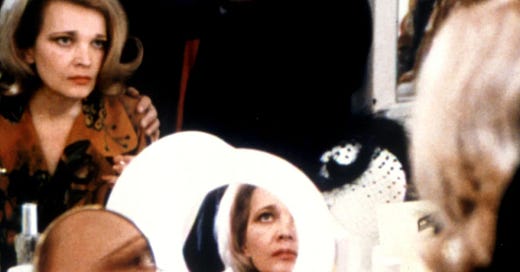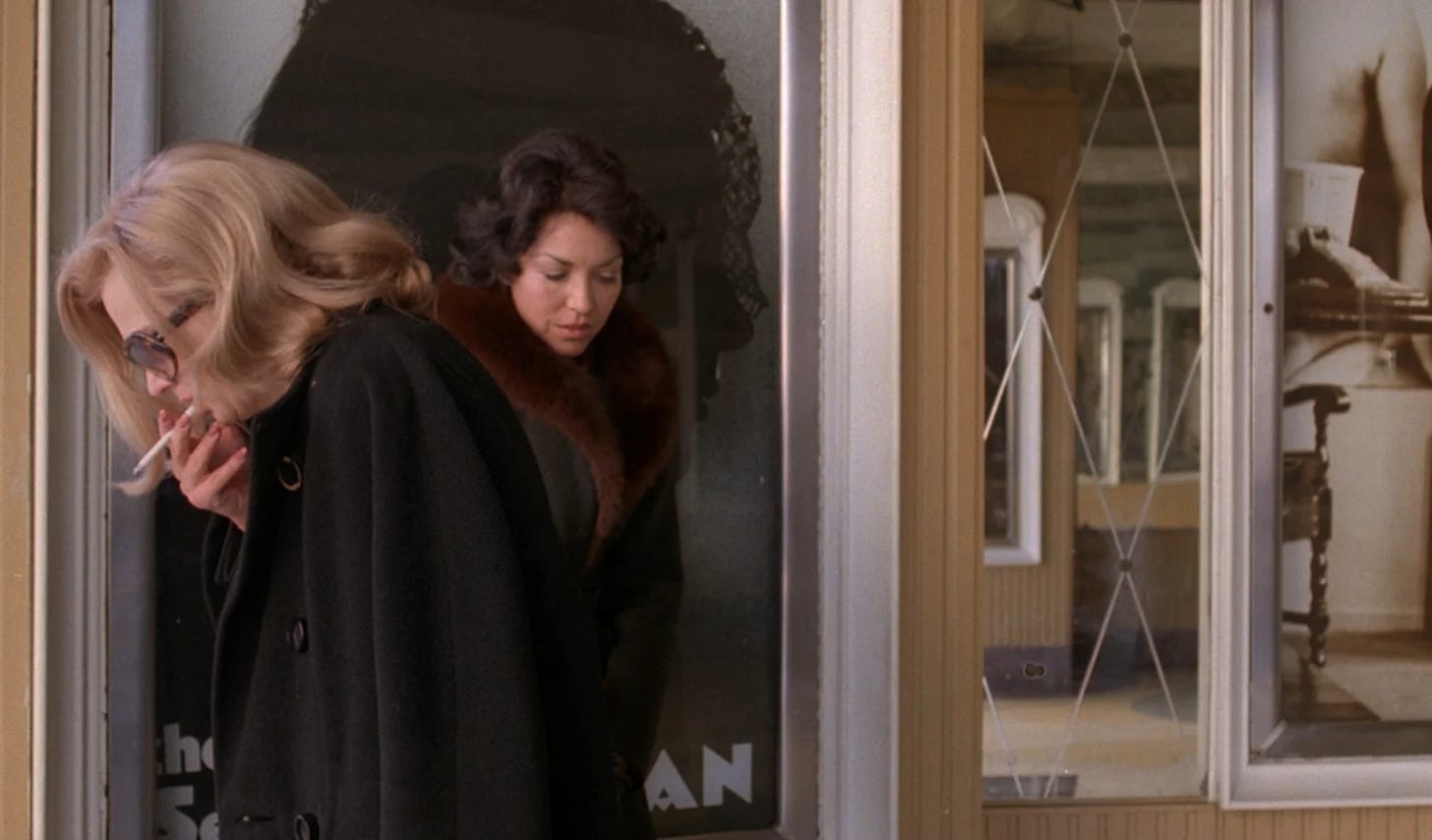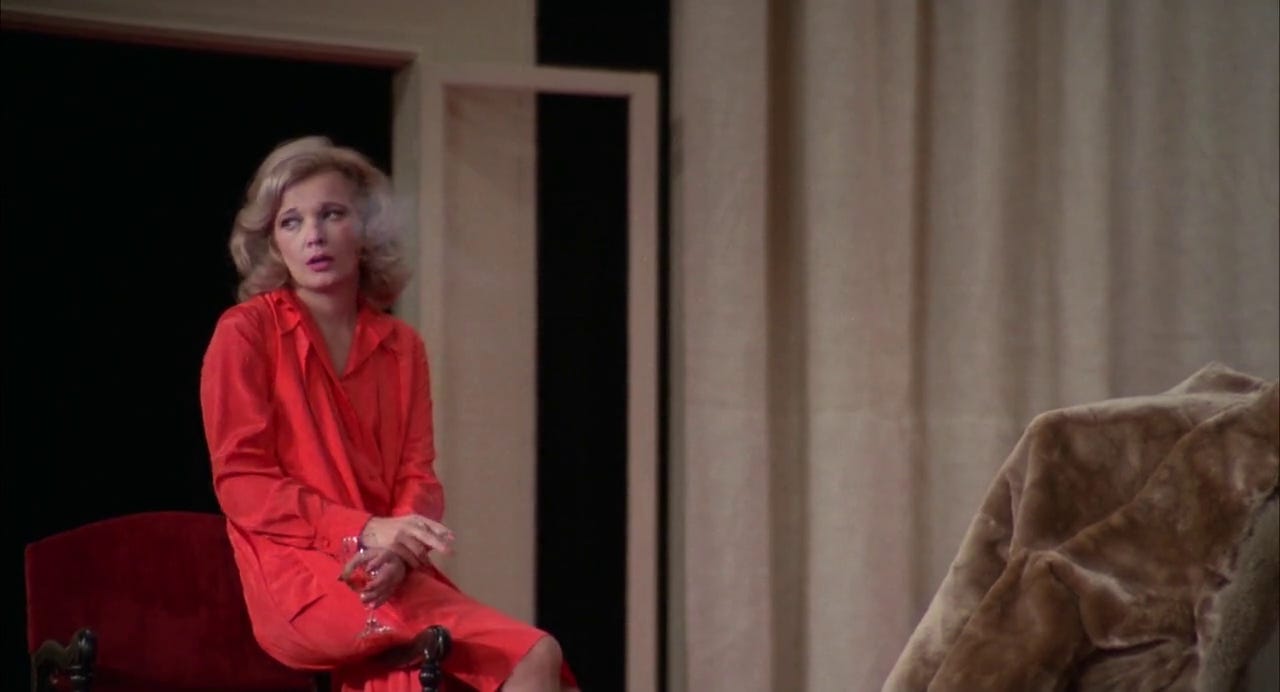Ghosts and Mirrors: Gena Rowlands in ‘Opening Night’
One of the late actress's most remarkable performances can be found in a film about the dangerously blurry lines between life and art.
Midway through the 1977 film Opening Night, a backstage drama written and directed by John Cassavetes, it becomes clear that the leading lady of the play within the film has gone off script and might never be coming back. During the final scene of a performance of a new play titled The Second Woman in New Haven, Myrtle Gordon (Gena Rowlands), teary and broken-looking after playing a moment in which her character is slapped, tells her scene partner Maurice (Cassavetes) he’s a wonderful actor and that, “We must never forget this is only a play.” Wonderful actor he might be, but even Maurice doesn’t know how to play along, raising his eyebrows and breaking into a frustrated chuckle as the confused audience breaks into applause before the curtain falls. This is an out-of-town tryout designed to smooth out the piece’s rough edges a few days before its Broadway debut, but Myrtle has arrived not with sandpaper but a sledgehammer.
It’s tempting to call Gena Rowlands’ performance in Opening Night a tour de force, but the label doesn’t really apply, if only because it brings to mind a certain type of towering, high-volume, shut-everyone-else-on-screen- down performance. Rowlands, who died on August 14th at the age of 94, was undoubtedly capable of that kind of work, but what she does in Opening Night defies that kind of easy categorization. It’s slippery and unpredictable, at once nuanced and raw.
Opening Night is filled with reflections both literal and figurative. We see Myrtle’s face in dressing room mirrors, in the younger self she imagines to be haunting her, and in the plot of The Second Woman, with its parallels to Myrtle’s own life. There’s another layer, too. Myrtle, like Rowlands, is an actress who’s crossed over into middle age. She’s aware of what that means in her profession and the doors that have closed behind her as, undoubtedly, Rowlands was as well. Rowlands seems to understand Myrtle better than Myrtle understands herself, but that doesn’t stop her from disappearing into the role.
Yet nothing in Opening Night or Rowlands’ performances suggests she’s on the outside looking in, which is all the more fitting for a film concerned with how acting can confuse such distinctions. In the tense backstage gathering that follows Myrtle’s fourth wall-breaking announcement to the audience that they’re watching a play, booze flows freely — as it does throughout the film — as Myrtle faces a chorus of disapproval that includes the play’s director Manny (Ben Gazzara), producer David (Paul Stewart), and writer Sarah (Joan Blondell). “Do you like the part?” Manny asks and Myrtle doesn’t even have to hesitate before saying “No!” She claims she doesn’t understand or respect the character she’s playing, a middle-aged woman going through a series of crises involving past and present lovers as she confronts the passing of time. But though she professes not to be able to get below the surface of the script, all signs suggest she’s in too deep, that her protestations are an attempt to deny how well she understands the part she’s playing.
Famous enough to draw crowds of autograph seekers wherever she goes — though a later exchange with a hotel worker suggests she hasn’t been working in the movies too frequently of late — Myrtle has an encounter with an intense teenage admirer named Nancy (Laura Johnson) while leaving a performance in the rain. After Nancy is struck and killed in an automobile accident shortly after Myrtle’s driver pulls away from the scene, Myrtle starts to have visions of Nancy in which the dead girl starts to blur into the girl Myrtle used to be, a specter who regards her alternately with affection, disappointment, and even violence. Nancy’s death serves as an inciting incident for Myrtle’s subsequent breakdown. Or maybe it’s just a catalyst for a breakdown that had already begun.
“When I was seventeen I could do anything,” Myrtle says. “It was so easy. My emotions were so close to the surface. I’m finding it harder and harder to stay in touch.” Repeated, with a slight variation, at two points in the film, it’s one of Opening Night’s most haunting pieces of dialogue. But, as with much of the film, it shouldn’t necessarily be taken at face value. Nancy plays the role of the ghost of her past, but The Second Woman offers plenty of other reminders of what’s come before via old lovers — Myrtle has been entangled at various points with Maurice, Manny, and David — and familiar situations. She may not have experienced these specific drunken arguments, but all drunken arguments wind up looking much the same whatever their causes. On stage and off, Myrtle reacts with unsettling intensity. If anything, her emotions now appear to be too close to the surface.
Somehow Rowlands conveys all this at once without giving away the central mystery of Myrtle. Is she truly haunted by ghosts? (Her cavernous New Haven apartment could almost pass for an unseen corner of the Overlook Hotel and the spare Bo Harwood score often sounds like it’s on loan from a horror movie.) Has she lost her mind? (She’s surrounded by cast members who’ve known her for years but even they seem taken aback by her behavior.) Is she an alcoholic in the advanced stages of the condition? (If so, it seems like everyone else involved with The Second Woman has the same affliction.) Is this really a breakdown or just the most torturous sort of acting preparation imaginable?
The film never answers any of these questions, particularly a nearly impossible to read final act in which Myrtle arrives at her play’s opening night in a state of falling-down drunkenness, then proceeds to take the stage anyway. What follows could be a disaster or the acting equivalent of Dock Ellis pitching a no-hitter while tripping on LSD. The on-stage moments depicted in the film don’t make the outcome clear one way or another. Only the warm reception both the play and its lead receive suggests a triumph but this, too, could just be a final bit of irony. Watch the movie over and over and you can arrive at different conclusions each time.
Eulogizing Rowlands in The New Yorker, Richard Brody described her as the actor, ”whose performances offer the most surprises, the most shocks, the most moment-to-moment inventiveness, and, above all, the most almost-unbearable force of emotional expression, combining extremes of strength and vulnerability, of overt display and inner life.” For almost any other performer, that would sound like hyperbole. When describing Rowlands, particularly her performances in Cassavetes’ films, it almost sounds like understatement.
Rowlands’ death underscores how easy it is to take artists for granted while they’re still still with us. When I first encountered her in the opening segment of Jim Jarmusch’s Night on Earth, I knew her name but little else, so the layers of irony in her playing a Hollywood casting agent trying to draw Winona Ryder’s grease monkey taxi driver into the film industry were lost upon me. Like Cassavetes, Rowlands spent her career alternating between Hollywood work and passion projects. In early years, she worked steadily on television and onher IMDb pageA Woman Under the Influence and Opening Night are separated by an appearance on Marcus Welby, M.D., a guest spot on Columbo (opposite her friend Peter Falk), and the forgotten thriller Two-MinuteWarning (alongside Cassavetes). In later years, she turned up steadily, sometimes in films by her children Nick and Zoe Cassavetes, sometimes on episodes of Monk or NCIS. She was reliably good, too. (She was Gena Rowlands, of course she was good.) But sometimes she got a chance to be astonishing. Sometimes watching her could feel like staring at the sun.







Night on Earth was also my intro to Rowlands! And Roberto Benigni, too, and Jim Jarmusch for that matter. I think it might have been the first artsy film I saw (my junior year in college, I believe). Also introduced me to Tom Waits, who I think sings at the beginning of the movie ("who the hell is this guy who sounds like the gravel in his voice has gravel?")? It's been 30+ years so my memory is hazy at best, but I do remember wanting to see it...for Winona Ryder of all people!! I had a crush on her after Edward Scissorhands. 🙃 The Benigni story was my favorite, as it careened from comedy to tragedy.
Looking forward to watching Opening Night - this looks a meaty movie.
Thanks for this tribute. I'm most familiar with her work in Gloria. Rowlands was a great vessel for converting strength and facility simultaneously.